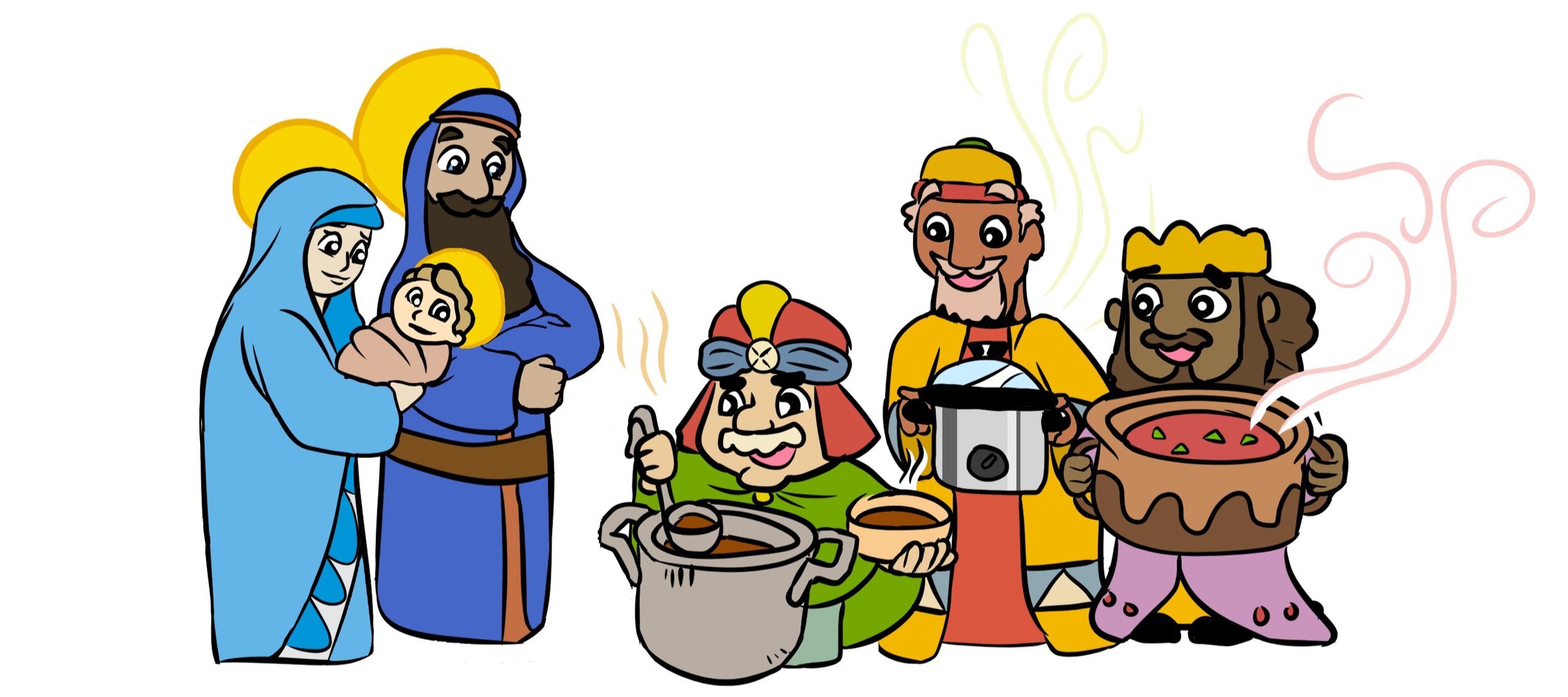
Epiphany
Epiphany Chili Cook-Off
January 3th, 2026, after 5pm Mass at Holy Family Hall. Register to Compete by Dec 31, 2026
For Contestants
This is a competition between chilis, so register, make, and bring your chili. Tables and extension cords will be available to keep the chili warm, NO cooking at HFH.
Please make a crock pot size of chili as this will be dinner for parishioners attending. From the crock pot, fill 3 bowls of chili for the judges, then serve the crowd your chili!
Juan Saucedo
210 385-4625 (leave message)
jsauce_do@hotmail.com
Prizes
3 official St. Joseph judges will select the best tasting chili:
Gold: 1st place
Frankincense: 2nd place
Myrrh: 3rd place
Winners will be listed in the bulletin and will win a space in a food booth at the St. Joseph Oktoberfest for 2026.
For Attendees
Bring water to be blessed for the Epiphany water blessing. The blessing will take place in Holy Family Hall after the contest winners are announced. Place your water to the right of the stage in Holy Family Hall.
If attending, please RSVP with total number of family members. RSVP is not required to attend, but it helps us plan appropriately.
Sides requested: Name your side: corn bread, garlic bread, salads, desserts, other. Sign up after each Mass (Name and email), call the office, or contact:
Juan Saucedo
210 385-4625 (leave message)
jsauce_do@hotmail.com
About the Epiphany
The Epiphany of Our Lord is a most ancient feast celebrating primarily the baptism of Our Lord. “Epiphaneia” in Greek means manifestation or appearance, for it was at Christ’s baptism that He was revealed to the world:
And when Jesus was baptized, he went up immediately from the water, and behold, the heavens were opened and he saw the Spirit of God descending like a dove, and alighting on him; and lo, a voice from heaven, saying, “This is my beloved Son, with whom I am well pleased.”
- Matthew 3
Epiphany was in some places celebrated rather than Christmas as the day of Christ’s birth, a custom still kept by some of the churches of the East.
This feast is kept on January 6, on the 12th day after Christmas. In the United States, the feast is transferred to the nearest Sunday.
In the West, two of Christ’s other “manifestations” were celebrated on Epiphany: the visit of the Magi (the manifestation to the Gentiles) and the wedding at Cana (the beginning of His public ministry). These Magi were learned men from the East who, while not Jews, were seeking God. They were not kings, but Zoroastrian priests (an ancient Persian religion). According to tradition, their names are Casper, Melchior, and Balthazar.
Now when Jesus was born in Bethlehem of Judea in the days of Herod the king, behold, wise men from the East came to Jerusalem, saying, “Where is he who has been born king of the Jews? For we have seen his star in the East, and have come to worship him.” When they saw the star, they rejoiced exceedingly with great joy; and going into the house they saw the child with Mary his mother, and they fell down and worshiped him. Then, opening their treasures, they offered him gifts, gold and frankincense and myrrh.
- Matthew 2
Each of the gifts is symbolic of Christ: gold, indicating that He is a king; frankincense, like what we use at Mass, indicating that He is fully God; and myrrh, used in preparing dead bodies for burial, indicating that He is fully man.
Because of the emphasis in the West on the Magi on Epiphany, the Church in the 50’s established a separate feast for the baptism of the Lord.
Celebrating Epiphany
During Mass on the Epiphany, the deacon or cantor proclaims from the ambo the proclamation of the moveable feasts (the feasts whose dates change every year), including Easter, Pentecost, and the first Sunday of Advent.
Even though in the West, the Baptism of the Lord is now a separate feast, traditions regarding baptism are still linked to the ancient celebration of Epiphany. On Epiphany, water is blessed with an especially powerful blessing, reminding us of the waters of Christ’s baptism and our own baptism.
Homes are blessed with chalk from the church. Above the door, the head of the household writes “20+C+M+B+25”, with the number changing every year for the current year since Christ’s birth. The “CMB” stands for “Casper, Melchior, Balthazar,” as well as “Christus mansionem benedicat” (May Christ bless this house). Chalk will be distributed after every Mass on the Epiphany.
The proclamation will be chanted at the Masses on Epiphany Day itself. Traditionally, the faithful would gather to commemorate the vigil for a feast on the night before (which was optional) and prepare for the feast, then return on the feast day itself to celebrate (according to the precept of the Church).
Following the anticipatory Mass, there will be an Epiphany Chili Cookoff, with food, activities for children, and a visit by the three Magi. During the Chili Cook-Off on Saturday, Fr. James will bless Epiphany water, which will be available for parishioners to take home and use as holy water.
